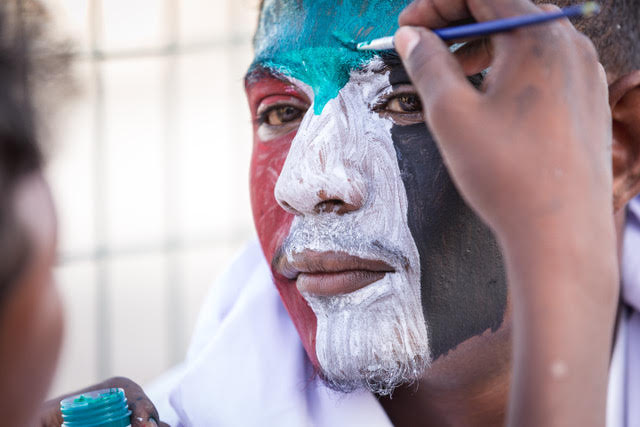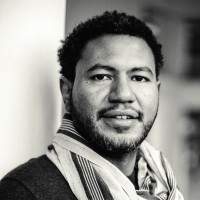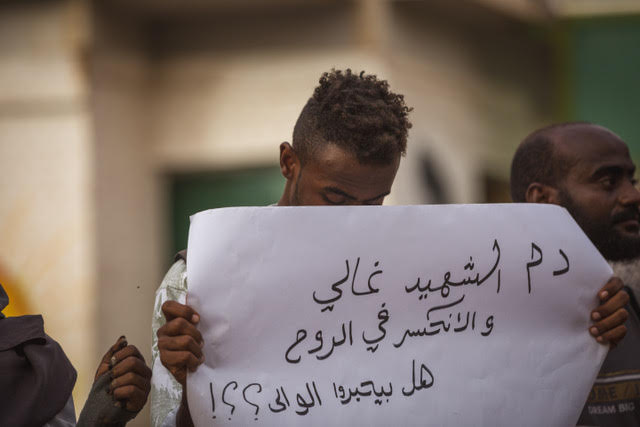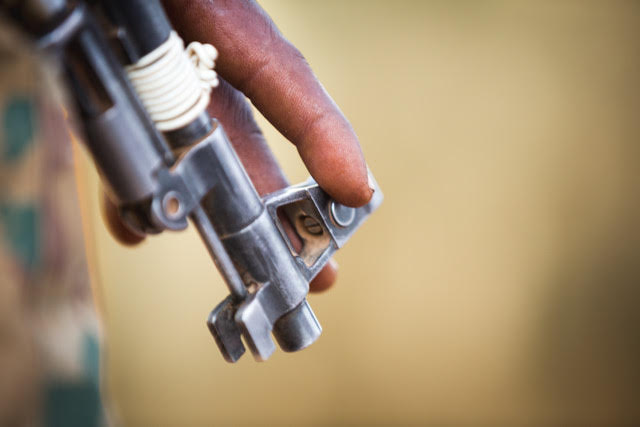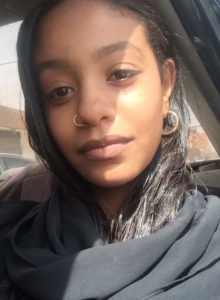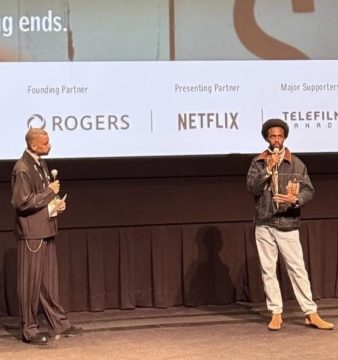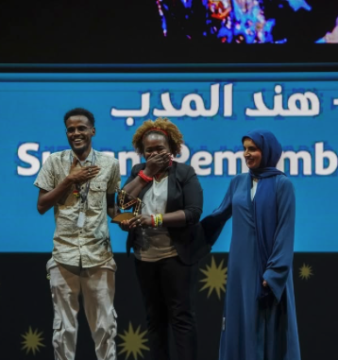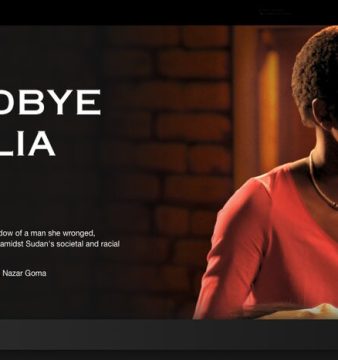MADANIYA: A New Sudanese Documentary Reflecting on the December Revolution
MADANIYA is a new feature documentary about the revolution in Sudan, which began on 19 December 2018 in response to hiking prices of bread and other essentials and continued throughout 2019, bringing crucial political changes to the country. The documentary tells the story of a popular revolution against the 30-year dictator Omar Al Bashir and his National Congress Party (NCP) through the lens of three young people who played central roles in the revolution, which consequently forever changed their lives.
MADANIYA will premiere at the Sheffield Documentary Festival in Sheffield, the UK on 13 and 14 June 2024. It has been nominated for the Youth Jury Award as well.
MADANIYA is by Sudanese filmmaker Mohamed Subahi. Although he is a filmmaker, Subahi graduated from Alahliya University in Khartoum in 2006 with a degree in computer science, and later worked in the field for multiple years. In 2010, Subahi joined a filmmaking workshop at Goethe Institute, where he acquired the skills and tools that enabled him to become a filmmaker and this was his launching pad towards the filmmaking world. In the same year, he and a group of friends from the same workshop established Sudan Film Factory (SFF), an independent film and cultural platform that builds the capacities of young Sudanese artists. They produce films, and expose Sudanese audiences to filmmaking and cinema. From 2010 to 2014, Subahi and his co-founders worked closely with young Sudanese filmmakers to launch the first independent cinema festival in Sudan in 2014.
In 2013, he produced his first two film creations Raħala (Nomads) and Mahata Kanoon (A Bonfire Station). In the following years, he worked with different non-governmental organisations (NGOs) in Sudan as a filmmaker, art director, and in other creative roles.
Like every Sudanese individual who witnessed the December revolution, Subahi participated in the revolution. He was naturally inclined to use his talent in and passion for photography and filmmaking. ‘I held the camera and started shooting, at first I was shooting for the sake of documentation to later decide on making a documentary,’ he said.
While at the popular monthslong sit-in in front of the headquarters of the Sudanese Armed Forces (SAF) that played a role in the ousting of former Sudanese President Al Bashir, Subahi noticed Esra, Momen and Django, and was fascinated by their stories, the roles they played and what MADANIYA, which translates to civilian rule, means to them. He found himself following these three young people who played leading roles in the revolution, and the revolution was central to them and their lives.
Then on 3 June 2019, more than 100 people were killed at a sit-in by armed forces, mainly the paramilitary Rapid Support Forces (RSF). At this point, Subahi had a very large database of photos and hours of videos from the revolution and the sit-in. He felt this would impose a real danger on his life, which made him flee Sudan through Ethiopia then go to Germany and save the data he had there. In Germany, he met the film producer Florian Schewe, who walked him through the film idea and showed him the content he had at that point. Together, they developed a road map for the film and three days later, Subahi returned to Khartoum to continue working on the film.
After returning to Khartoum, he tried to reach out to his main characters in their homes to see how the events of 3 June affected them and reflect on their feelings, which was extremely difficult due to the high military alert and the internet blackout at the time. After 30 June 2019, Subahi was finally able to get in touch with his characters and followed them as they continued resisting and calling for ‘Freedom, Peace and Justice’.
About a year and a half after 3 June 2019 and into the transitional period, specifically on 9 October 2021, Subahi decided to conclude the film and headed to Egypt to start working on the post-production. A couple of weeks later, the 25th of October coup d’etat took place, where a military coup led by General Abdel Fattah Al Burhan took control of the government of Sudan, removing former Prime Minister Abdalla Hamdok and dissolving the Sovereign Council. Subahi immediately paused his work in Egypt and traveled back to Sudan. ‘This event changed the entire film course,’ he said. As he put it, he wanted to capture the reaction of the main characters to the coup, how their strategies pivoted and how it affected their hopes, dreams and ambitions of having a democratic civilian-led government.
Filming continued until 2023. This is when Subahi then returned to Egypt to continue working on the post-production of the film after adding almost two years worth of footage to the original film.
‘Originally the film followed the story of five people, but due to the nature of documentaries where you want to make sure the audience gets to know the characters closely and due to the large size of the content we had to choose only three main characters,’ he explained.
MADANIYA comes at a very sensitive moment in history where Sudan is currently torn by war between the two power-sharing military factions the Sudanese Armed Forces (SAF) and the Rapid Support Forces (RSF). ‘This film would be a reminder and a living archive of the greatest revolution in Sudan’s modern history, it will inform the audiences especially the non-Sudanese about the story of the peaceful revolution and the dreams of the Sudanese nation of having a democratic civilian government through the eyes and the personal stories of the film’s characters,’ Subahi explained.
As a filmmaker, Subahi believes Sudan is a very rich country in terms of history, culture and everything in between; thus, there are a lot of untold stories that could and have to be told to the world. MADANIYA is his first feature documentary, this is one of the stories that is worth telling and sharing with the world as well as archiving.
‘I am very happy to see MADANIYA getting recognised by international professionals in the industry like Sheffield and its nomination to the Youth Jury Award, I am also very proud to get the chance to tell the story of Sudan and the December Revolution,’ he said.
For more information, see MADANIYA’s social media pages on Facebook, Instagram, and X (formally Twitter). Screening dates and locations will be announced through the pages and website.
You can also see Mohamed Subahi’s Facebook page and Instagram account @mohamed_subahi.
Thuraya Salih (1998), born and raised in Omdurman in 1998, is a self-taught writer, who started publishing her work in 500Words Magazine in 2019, and in Andariya Mazagaine in 2020. She recently became an Editor at Andariya Magazine. She is interested in the intersectionality between arts, culture and sociopolitical topics such as identity and feminism, most of her writings share a theme of being centred around youth.

